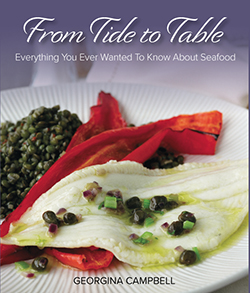Grow It Yourself - March

The rise of carbs such as rice, pasta and cous cous has seen sales of potatoes decline by 20% in the last decade. In fact Bord Bia reports that sales of the spud could fall by as much as 40% in the next decade if the trend continues unchecked. The spud’s reputation has taken a hammering of late – it is deemed a little old fashioned, fattening and a hassle to cook.
Take a deeper look beneath the headlines however and you find a product that’s far more than just a carbohydrate. Take away the copious quantities of fat that we often add through cooking (or post-cooking) of potatoes and you have an exceptionally healthful low-calorie, high-fibre food that’s also a great source of potassium, vitamin B6 and vitamin C. It is also generally speaking an entirely unprocessed food and let’s be honest, the same simply can’t be said for pasta.
To top it all, at a time when more of us are committed to supporting local foods, the potato is a genuinely home-grown product, and by buying it we support a huge local industry of growers and packers (whereas sweet potatoes are generally imported from the US). Thankfully, the potato is one of the few remaining vegetables where Irish people generally won’t tolerate a foreign import equivalent and that’s good for the environment too.
Few of us are lucky enough to be able to grow enough spuds to be self-sufficient and that’s fine – it’s good to grow some of them ourselves AND support local growers at times of the year when we don’t have our own. I like to think that GIYers can act as the ultimate spud ambassador - as growers we get to understand this wonder-crop a little better and at a time when the number of potato varieties is reducing sharply (with Irish tastes increasingly consolidating around Roosters), we get to try lots of different varieties and sample the flavours.
So in March we celebrate St Patrick’s Day in our house with the ritual of sowing our early potatoes. I don’t buy the idea that spuds are old-hat or that their best days are behind them – in fact I think it’s only a matter of time before contemporary Ireland falls in love with them all over again. After all they are a healthy, local, seasonal super-food – so what’s not to love?
Things to do this Month - March
To Do
Continue to prepare ground – there is still time to prepare a plot to grow veg this year. Fork or rake over existing beds, breaking up large clods of earth. Cover new seedlings with fleece if a frost is due. Start your daily slug patrols and lay beer traps. Don’t let new-season weeds take over – get on top of them with weekly hoeing.
Sow
Indoors: lettuce, aubergine, peppers, cucumbers, celery, celeriac, sweet corn, basil, leeks, summer cabbage, cauliflower, Brussels sprouts, parsley, courgette, French beans.
Sow outdoors or under cover: broad beans, red cabbage, carrots, cauliflower, spinach, kale, Brussels sprouts, onions, leeks, turnip, peas, radishes, early lettuce, asparagus. Plant your first early seed potatoes, as soon as weather conditions allow.
Harvest
This month you could be enjoying (from the ground and from storage) onions, leeks, parsnips, potatoes, some varieties of lettuce, mint, sprouting broccoli, kale, rhubarb, chard, the first of the spring cauliflowers and cabbage, and spinach (perpetual, spinach beet).
 Recipe of the Month – Potato and Chickpea Masala
Recipe of the Month – Potato and Chickpea Masala
This recipe from the potato.ie website puts potatoes center stage in a classic masala and can be prepped and cooked in under half an hour. The spinach doesn’t have to be baby leaf – if you have your own home-grown spinach, you could chop it before adding instead. Serves 4.
Ingredients:
• 900g Maris Piper/Rooster potatoes, peeled and cubed
• 1 tin of chickpeas, drained
• 3tbsp masala curry paste
• 1tbsp garam masala
• 2 onions, sliced
• 2tbsp sunflower oil
• 2 cloves of garlic
• 1tbsp fresh grated ginger
• 1 tin of chopped tomatoes
• 1 tin of coconut milk
• Large handful baby spinach
• 1 tbsp fresh chopped coriander
Directions:
In a large pan or casserole pot gently cook the onion for 5 minutes in the sunflower oil. Next add the garlic, ginger, garam masala and curry paste, continue cooking for 3 minutes over a medium heat. Now add the potatoes and chickpeas and give them a stir in the lovely spices making sure everything is coated.
Pour in the tinned tomatoes and coconut milk and bring to a steady simmer. At this stage add a little salt and milled pepper. Continue cooking until the potatoes are soft. If the sauce feels a little dry just add a little water.
Just before serving stir in the spinach and coriander and serve with yoghurt.
Tip of the Month – On Sowing potatoes
Sow early potatoes from mid March (St Patrick’s Day traditionally) in single rows, 15cm deep, 25cm apart and 45cm between rows. Maincrop spuds are sown in mid to late April. Increase spacing between the spuds to 35cm. It is vitally important to include potatoes in your crop rotation as they are susceptible to disease if grown in the same ground year on year. Earlies will be ready about 14 weeks after sowing. Maincrops take 18 weeks. I typically leave my earlies in the ground and dig as required. They do fine in the ground until September at which point we move on to maincrop. Maincrop can stay in the ground until the first frosts – lift them then and store in hessian sacks. For a GIY video tutorial on growing spuds check out www.giyireland.com/videos/detail/potatoes.
Join GIY
By joining GIY you help us to continue the work of supporting people just like you to grow food at home, at school, in the workplace and in the community – each year we support over 65,000 people and 1,500 community food growing groups and projects. It costs just €35 to join GIY for a year, and to say thanks we will send you a seasonal copy of our supporter’s magazine GROW and some GIY seeds for you to sow each quarter. We will also send you our weekly tips, news and advice ezine and offer you discounts to GIY events like the annual GROW Fest. Join today at www.giyireland.com.
 About GIY
About GIY
GIY is a not-for-profit organisation that aims to create a healthier, more sustainable world where people grow their own food. We inspire and support people to grow food more successfully by bringing them together to share advice, tips and ideas. There are approximately 65,000 people involved in the GIY movement in Ireland, which is proudly supported by Woodies DIY.
For more information check out www.giyireland.com
Michael Kelly is a freelance journalist, author and founder of GIY Ireland.
© GIY Ireland 2016 – all rights reserved.







There are currently no comments
Leave a comment
Not a member? Register for your free membership now!
Or leave a comment by logging in with: